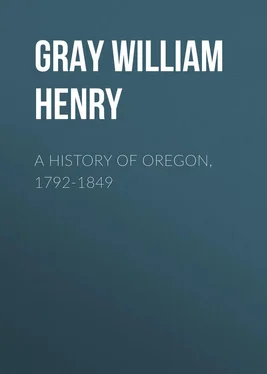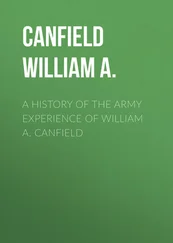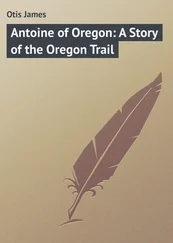William Gray - A History of Oregon, 1792-1849
Здесь есть возможность читать онлайн «William Gray - A History of Oregon, 1792-1849» — ознакомительный отрывок электронной книги совершенно бесплатно, а после прочтения отрывка купить полную версию. В некоторых случаях можно слушать аудио, скачать через торрент в формате fb2 и присутствует краткое содержание. Жанр: literature_19, foreign_antique, foreign_prose, Историческая проза, на английском языке. Описание произведения, (предисловие) а так же отзывы посетителей доступны на портале библиотеки ЛибКат.
- Название:A History of Oregon, 1792-1849
- Автор:
- Жанр:
- Год:неизвестен
- ISBN:нет данных
- Рейтинг книги:5 / 5. Голосов: 1
-
Избранное:Добавить в избранное
- Отзывы:
-
Ваша оценка:
- 100
- 1
- 2
- 3
- 4
- 5
A History of Oregon, 1792-1849: краткое содержание, описание и аннотация
Предлагаем к чтению аннотацию, описание, краткое содержание или предисловие (зависит от того, что написал сам автор книги «A History of Oregon, 1792-1849»). Если вы не нашли необходимую информацию о книге — напишите в комментариях, мы постараемся отыскать её.
A History of Oregon, 1792-1849 — читать онлайн ознакомительный отрывок
Ниже представлен текст книги, разбитый по страницам. Система сохранения места последней прочитанной страницы, позволяет с удобством читать онлайн бесплатно книгу «A History of Oregon, 1792-1849», без необходимости каждый раз заново искать на чём Вы остановились. Поставьте закладку, и сможете в любой момент перейти на страницу, на которой закончили чтение.
Интервал:
Закладка:
W. H. Gray
A History of Oregon, 1792-1849 Drawn From Personal Observation and Authentic Information
INTRODUCTORY
The reader will observe that when we commenced furnishing the historical articles for the Marine Gazette , we did not know that they would be of sufficient interest to justify arranging them in book form; but few articles had been given, however, before there was a call for back numbers of the paper, which were not on hand. It was then decided to continue the articles, giving an opportunity to correct errors in statement of historical facts, and collect such as were printed, with all just criticisms, review the whole, and complete the manuscript for publication.
As will be seen, we have endeavored to narrate events in plain language, and as nearly in the order of occurrence as possible.
We make no claim to literary merit or attractive style; the facts we have collected, the proofs we are able to give of the policy and practices of one of the most gigantic frauds ever continued for a series of years by one professedly civilized and Christian nation upon another, in chartering and continuing to license a monster monopoly; and the manner in which they have sought for a series of years to prevent American trade and settlement of the western portion of our country, is contained in the following pages. We can only give the principal events, which in the future may be better arranged in an interesting and authentic history, which we must leave for others to write. The reader will find in the following pages: —
I. The American history of the Hudson’s Bay and Puget Sound Agricultural companies.
II. The causes of failure of the Protestant missions, the causes of Indian wars, and the causes that must tend to the utter destruction of the Indian race on the American continent.
III. The adverse influences that the early settlers had to contend with in coming to and settling in the country, fully explained.
IV. A concise history of the early settlement of the country, a short sketch of many of the public men in it, their public character and proceedings, and the organization of the provisional government.
V. The mining and agricultural interests of the country.
There are two grounds upon which every fact is based: —
1. Personal knowledge, observation, and participation in what is stated for one-third of a century.
2. The written and printed statements of others, so compared that conclusions are intended to be without a possibility of truthful contradiction; thus making this a standard history of the country for the time included within the period from its discovery by Captain Robert Gray to 1849.
CHAPTER I
First discovery of the river. – Natives friendly. – British ship. – Brig Jennet . – Snow Sea Otter . – The Globe . — Alert. — Guatimozin. — Atahualpa. – Lewis and Clarke. – Vancouver. – Hamilton. – Derby. — Pearl. — Albatross. – First house built in 1810. – Astor’s settlement. – The Tonquin . – Astor’s Company betrayed to the Northwest Company.
In all countries it is difficult to trace the history of their early discovery and settlement. That of Oregon is no exception. The Spanish claim, and it is generally conceded, that they were the discoverers of the coast, and gave names to the principal capes and to Fuca’s Straits. No evidence can be found in national archives, or among the native tribes of the country, that gives the discovery of the Columbia River to any civilized people but to the Bostons (Americans); so that, so far as civil history or national testimony is concerned, we are without any, except the conjectures of men as ignorant as ourselves. Hence we are left to the alternative of searching the old logs of vessels and such old books as have been written, and, in connection with the legends and statements of the aborigines of the country, form an opinion as to its discovery, and from such dates and conclusions commence its civil history. That of Oregon begins eight years previous to the commencement of the present century.
A ship, owned by Messrs. Barrell, Bulfinch & Co., of Boston, and commanded by Captain Robert Gray, discovered and entered the mouth of the third great river upon the American continent. It then had no name known to the civilized world. This unselfish American, instead of following the example of many contemporary British navigators by giving his own name to the majestic river he had discovered, gave it that of his noble ship, Columbia .
On the 7th of May, 1792, he discovered and ran in abreast of Cape Hancock, and anchored, and on the 11th ran ten miles up this river on the north side, which is now known as a little above Chinook Point, and at 1 P. M. they came to anchor. On the 14th they weighed anchor and ran, according to the ship’s log, fifteen miles, which would bring them up abreast of Tongue Point, where their ship grounded upon a sand bar for a short time, but they backed her off into three fathoms of water and anchored. By sounding they discovered that there was not sufficient water to pass up the river in their present channel. Having filled all their water-casks, repaired, painted, and calked the ship, and allowed the vast numbers of Indians that thronged around them in the most peaceable and friendly manner, to visit and traffic with them, on the 20th of May, 1792, they went to sea again.
On the 20th of October of this year, the Chatham , commanded by Captain Broughton, of the British navy, entered the river. He grounded his ship on what is now called the Sulphur Spit, and found in the bay the brig Jennet , Captain Baker, from Bristol, Rhode Island. Captain Broughton explored the river in his small boat as high up as the present site of Vancouver, and left the river with his ship on the 10th of November.
In 1797, five years later, the snow Sea Otter , Captain Hill, from Boston, visited the river.
In 1798, the ship Hazard , Swift, master, owned by Perkins, Lamb & Co., Boston, visited the river. This same ship visited the river again in 1801.
In 1802, this same Boston company sent the ship Globe , Magee, master, to the river.
During the year 1802, a brisk, and something like a permanent American trade appears to have been in contemplation by this Boston company. They sent the ship Caroline , Derby, master, from Boston, and the ship Manchester , Brice, master, from Philadelphia.
In 1803, Lamb & Company sent the ship Alert , Ebbets, master; also the ship Vancouver , Brown, master. This year, the ship Juno , Kendricks, master, from Bristol, Rhode Island, owned by De Wolf, entered the Columbia River for trade.
In the year 1804, Theodore Lyman sent the ship Guatimozin , Bumsted, master, from Boston. The Perkins Company sent the ship Hazard , Swift, master, to the river the same year.
In 1805, Lyman & Company sent the ship Atahualpa , O. Potter, master, from Boston. Lamb & Company sent the ship Caroline , Sturges, master, from the same place.
On the 15th of November, 1805, Lewis and Clarke, with their party, having crossed the Rocky Mountains under the direction of President Jefferson, of the United States, arrived at Cape Hancock; remaining but a few days, they crossed the Columbia River and encamped near the mouth of a small river still bearing the name of these two explorers. They left their encampment in March, 1806, and returned across the continent and reported the result of their expedition to the government.
This expedition consisted of one hundred and eighty soldiers or enlisted men. On arriving at the Mandan Village, on the Missouri River, in 1804, they encountered the influence of the Northwest British Fur Company, who, on learning their object, at once made arrangements to follow and get possession of the country at the mouth of the Columbia River.
Читать дальшеИнтервал:
Закладка:
Похожие книги на «A History of Oregon, 1792-1849»
Представляем Вашему вниманию похожие книги на «A History of Oregon, 1792-1849» списком для выбора. Мы отобрали схожую по названию и смыслу литературу в надежде предоставить читателям больше вариантов отыскать новые, интересные, ещё непрочитанные произведения.
Обсуждение, отзывы о книге «A History of Oregon, 1792-1849» и просто собственные мнения читателей. Оставьте ваши комментарии, напишите, что Вы думаете о произведении, его смысле или главных героях. Укажите что конкретно понравилось, а что нет, и почему Вы так считаете.












